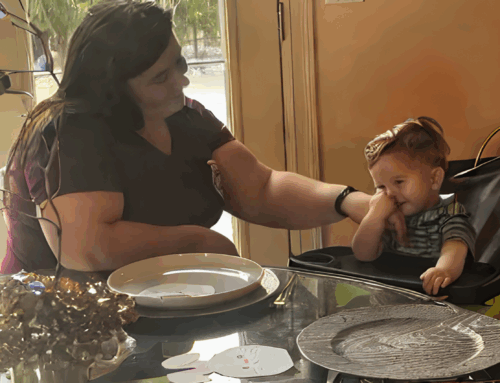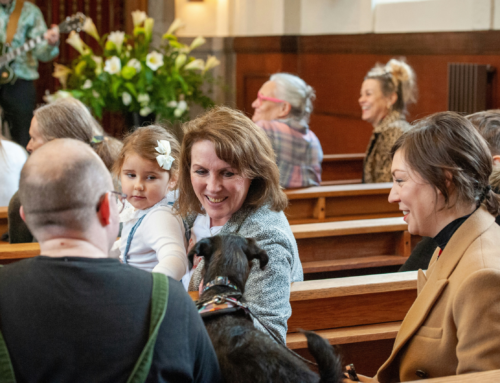This post is the conclusion to a two-part series. Read Part 1 here.
Honestly sharing our emotions with God is exemplified in the book of Psalms. While I am knowledgeable about the structure of a lament and how I might help myself or someone else write our own laments, prior to the keynote address by Tom Reynolds at the Unshaken Kingdom conference, I was not sure which circumstances were worth lamenting or how lamenting might help me and others to move through them.
In his book Vulnerable Communion, Reynolds characterized disruption as “divine interruption.” However, at the Unshaken Kingdom conference he clarified that while certain disruptions invent new ways of being together and possibilities within that, when you’re struggling to make do or find a way forward, it is not easy or helpful to think about new possibilities.
Some types of disruption are characterized by chaos and horror. For example, the disruption caused by the pandemic, particularly in the lives of people with disabilities is not trivial. Disruptions which are devastating are not always invitations to possibility. It is important that we honour and hold space for such disruptions, rather than rush to resolve tension.
Reynolds also touched on the theme of kinship, the flux and messiness which accompanies being in community with one another. Communities in general, and faith communities in particular, may have greater difficulty imagining places where everyone can and does belong because they fear being exposed or failing. Faith communities might be more hospitable if we were more open to being surprised. A biblical example of openness to surprise is found in Genesis 18 where Abraham and Sarah were visited by three strangers.
Reynolds related possibilities of belonging within the church, or wider community, to the patterns of jazz music. It is messy, full of tension, full of risk and dissonance. The ‘blue notes’ are played in the in-between spaces to amplify the cry. They allow for cathartic release. Reynolds inspired conference attendees to wonder; what it might look like for the church to make harmony amidst circumstances which do not resolve quickly?
Reynolds pointed out that playing music is an imaginative endeavour which sparks creativity. He linked the art of playing jazz music to the art of belonging. Like jazz, belonging is dynamic, ongoing and imaginative. Musical patterns involve tension and release.
In Christianity there is the tendency to rush toward resurrection, forgetting that the earliest disciples were utterly devastated and disoriented after the crucifixion. Like Jazz musicians, church leaders need to become masterful at holding tension and refrain from resolving it prematurely. Rather than encouraging others to strictly preach victory in Jesus, perhaps we need to make space for people to find their own voices and speak their hurts or cry out to God.
Reynolds raised the question, “How can our communities be attentive to genuine hardship?” A strategy for holding tension musically is called the blues. A strategy in the Bible is called lament. In traditional laments, the cry is typically longer than the acknowledgement of God and opportunity to hope, even if that opening is not entirely clear.
With respect to jazz music, the opportunities are within the tension. The blues and the art of lament create community as they resonate with others. Fellow sufferers and fellow comforters join together in response. Reynolds encouraged everybody to consider how the tensions that we live with might serve as an opportunity to form or transform community?
Reynolds shared the valuable insight that access to the church or other spaces should not be viewed as a one-time achievement or preplanned process. He further explained that access needs to be cocreated by everyone. It is not a program that works in the same way for everyone. It often requires improvisation. Reynolds noted that proactivity cultivates flexibility and elasticity in a way that reactivity does not. Further, remaining grounded may help us to be present to one another.
Reynolds framed dissonance, that is tension in music or in community, as an invitation to a deeper and more complex harmony. There are no wrong notes; just wrong resolutions. Resolutions require community. Our lives may be full of tension or disruption that is not easily resolved. There is a danger in early problem-solving, quick fixes or ‘three easy steps.’ In contrast, circumstances which resolve in unexpected ways open up possibilities.
To me, Reynolds’ insights illumine Romans 8:28. This verse says that God works all things together for the good of those who love God and are called according to God’s purpose. It does not mean that God’s people are meant to feel good in the midst of disruptive, devastating, horrible circumstances but there is the hope that God will make beautiful harmony out of what is ugly, broken, and possibly not from God.

Photo by Gerold Hinzen on Unsplash


